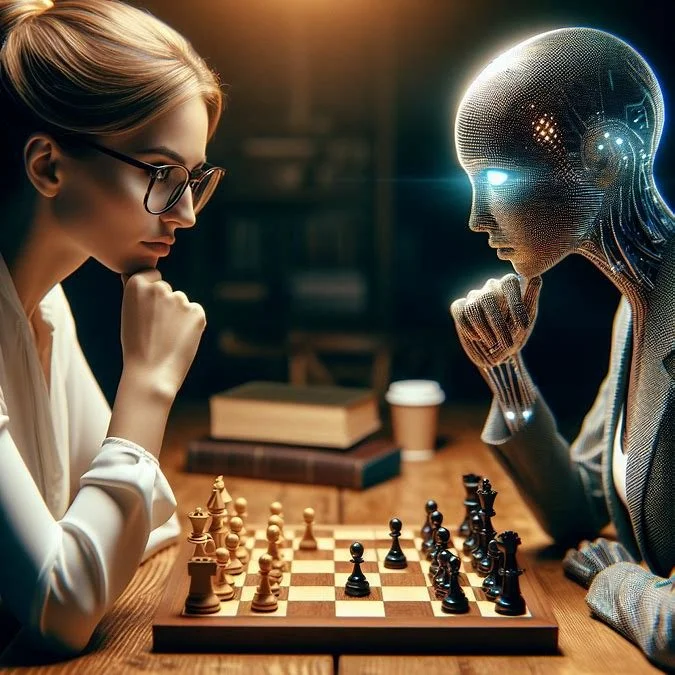AnAn: The Rise of AI and its Role in Chess
AI helps players train and practice against computers. No more waiting for other human players to accept, and no more fear of dropping ratings.
BY ANAN LIU - NORTH GWINNETT MIDDLE SCHOOL
HER LEAGUE MEMBER & HER NEWS COLUMNIST
Image created by Image generated with AI powered by Microsoft Copilot.
Ubiquitous Artificial Intelligence
AI. It’s practically everywhere. Short for artificial intelligence, AI is being developed to be used as teachers, chat companions, search bots, you name it. A study, which was conducted by an AI industry analyst in 2009, showed that experts believed that AGI (artificial general intelligence, an AI capable of fully performing human tasks) would become prevalent sooner than 2050. A survey was conducted again in 2013 by Vincent C. Muller and Nick Bostrom: they asked 550 different AI researchers when they believed AGI would exist. 50% of participants believed it would rise before 2040, and 90% said before 2075. A chart from McKinsey & Company showed that, in 2023 alone, 7.6% of businesses (from a total of about 700 respondents) use AI regularly in their work — and up to 43% have used it at least once. So, if artificial intelligence will almost certainly be everywhere, what effect will it have on chess — the most popular sport worldwide?
Artificial Intelligence as an Education Opportunity
First, AI can be used as a chess teacher, providing equal access to players who may not have the privilege to have a human teacher. Many chess websites already use this feature to help players analyze their games, such as Chess.com, Lichess, and ChessKids. AI coaching can analyze and calculate several moves per second, which is much faster than humans. This saves time and increases efficiency.
However, most AI coaches are unable to learn “traps”, especially in the opening. Players who face or implement traps like forks in the opening often struggle with their AI coach warning them against an inaccuracy, which can cost them the game. In an experiment I tested, I used many opening traps, such as the Ponziani and Stafford Gambit. 8 out of 10 times, the move that marked the famous traps were met with an inaccuracy by chess bots.
Unlimited Training!
AI helps players train and practice against computers. No more waiting for other human players to accept, and no more fear of dropping ratings. With chess bots, players can now play endlessly against a variety of differently rated opponents, receiving helpful feedback in the end. Almost every chess-playing platform has AI bots to help players prepare for tournaments, matches, and games.
Foul Play Potential
With so many benefits of AI, there’s bound to be foul play somewhere. Chess.com, the world’s largest and most popular chess website, has stated that “fewer than 0.2% of players cheat in online chess”. Although this may seem like a small number, this percentage means that more than 200,000 players have been found cheating on this website. Chess.com goes on to state, “chess.com closes more than 800 accounts every day for cheating.” That’s not to count for the “120 closures per day for sandbagging, rating manipulation, and other types of fair play violations”!
While artificial intelligence can benefit the chess community by creating equal access, it can easily be used for the wrong reasons. What matters is not the tools or technology we are using, but the people that are using it.
Works Cited
AI Multiple. “995 Experts Opinion: AGI / Singularity by 2060 [2020 Update].” AppliedAI, 8 Aug. 2017, research.aimultiple.com/artificial-general-intelligence-singularity-timing/ .
Aleksic, Adam. “Why Chess Is the Most Popular Sport in the World.” The Nest, 26 Feb. 2018, www.ahsthenest.com/archive/2018/02/26/why-chess-is-the-most-popular-sport-in-the-world/.
Mckinsey & Company. “The State of AI in 2023: Generative AI’s Breakout Year | McKinsey.” www.mckinsey.com, 1 Aug. 2023,
www.mckinsey.com/capabilities/quantumblack/our-insights/the-state-of-ai-in-2023-generative-ais-breakout-year .
Team (CHESS.com), Chess com. “About Online Chess Cheating.” Chess.com, 10 Oct. 2022, www.chess.com/article/view/online-chess-cheating .
